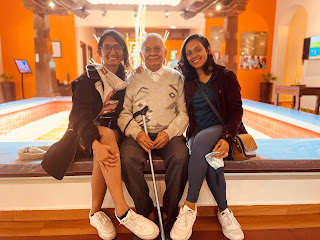Am I Responsible for My Aging Parents and My Grown Up Kids?
Am I Responsible
for My Aging Parents and My Grown Up Kids?
The idea that life is circular has
been around for a long time. From the changing seasons to birth and death, life
is an unending cycle. Throughout the centuries, people have found innumerable ways
to represent this concept. We humans are
bound to it just as firmly. As we get older, so do our parents and other loved
ones. We take care of parents while
nurturing our kids, they grow up looking at how we mindfully deal with our
responsibilities
Nearly half of adults in their 30s
and 40s have a parent 60 or older and are either raising a young child or
financially supporting a child. According to the Research about 1 in 7 is
financially supporting both an aging parent and a child. The dual role to
play at some point in life. And it’s a challenge sandwich generation has to
face.
There could be constant juggling of thoughts
Am I being loving and attentive enough?
Are my children becoming spoiled?
Are my parents happy?
Am I fulfilling my responsibility towards my
parents?
All the responsibilities of parenting fall under
one of these two headings.
Most of us come into the world viewing our parents as
healthy, strong and everlasting. As we grow, and as they age, the naive feeling
that they are a perpetual part of our lives fades. Their hearing weakens, their
gait slows, their memories dim, and for adult children the experience can
provoke feelings of anger, anxiety, fear and frustration. It's a
strange shift from when they were responsible for you. Now you might be
responsible for them, and they're not listening to your orders the way an
8-year-old would. You have kids who have also started dictating their terms.
You have dual responsibility towards both generation.
The Verdict: We have an innate responsibility to help loved ones as they
age, and to our grown up kids but there are limits
There will most likely be times when you’ll feel
that you just can’t go on. This is when your dedication to taking care of
yourself -- must remain stronger than ever.
At this point – Do your duty, Give your Best,
Balance yourself. Focus on true success and happiness and most importantly
don’t forget to take care of your wellbeing.
Challenges of the 'sandwich generation' and
how to deal with it.
Ø Talk
about Everyday Stuff — and Do It Every Day The more you do something, the easier it gets. Talking to
the adults in your life about everyday stuff builds a bond. It makes it easier
when you need to discuss something more serious.
Ø Find
something to chat about each day. You can keep it brief
and casual. Talk about how your team did at the track meet. Share something one
of your teachers said. Tell them about a school project. Share a fun post or
picture. Even small talk about what's for dinner can keep you feeling close.
Ø Do
things together that you both enjoy. Go for a walk.
Work out together. Cook, eat, play, make music, help out, or just hang out
together. This gives you a chance to have a casual chat.
Ø It's
never too late to start. If things feel
strained between you and your parent, ease into it. Mention that cute thing as
a kid you did. Watch a funny movie together to share a laugh. Talking about
little things might be a way to get closer
Ø Enable social inclusion. Create opportunities
for your loved one to play an active role in your family and in your community.
Isolation can be a major cause of emotional distress for older people.
Ø Learn and practice mindful communication. Don't be afraid to
have what can be a tough conversation about end of life care with your loved
one. Make use of the tools and resources available online to talk with your
loved one about the kind of treatment they receive and where they would like to
receive it.
Ø Educate yourself. Try to keep up to date with the
latest innovations in elder care and best practices in long term care. Keep
updating yourself with the latest technologies.
THE circle of life however it isn't a closed loop. To trap yourself in any one circle is just to limit your capabilities. Make sure you don’t fall inside closed loop. It is a constant journey of reconnecting with your life purpose and discovering many facets of yourself along the way. The more you treat your life as a journey, untangling all the circles, the more enjoyable the ride will be.
By
Dr. Mona Shah
Occupational Therapist, Clinical Psychologist.





Comments
Post a Comment